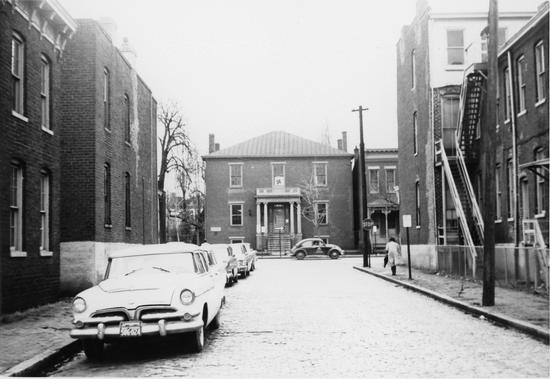Desegregation of Public Libraries in Winchester & Richmond, Virginia

“They won’t let me go inside.” Winchester, Virginia, 1953
One drizzly day in 1953, Charles H. Harper ascended the steps of the Handley Library in Winchester, Virginia. Even on a gray day, the Beaux-Arts beauty built in 1913 was resplendent with its marble columns, stained glass windows, and rotunda.
Harper was taken aback to see WW2 veteran and scholar Henry M. Brooks slumped despondently on the steps of the library. “Why are you sitting in the rain?” Harper asked. “Why don’t you go inside?”
“Mr. Harper, they won’t let me go inside,” Brooks answered. Harper was white; Brooks was Black. Harper was Chair of the Handley Board of Trustees. Brooks, having served his country in WW2 in eight battles including the Battle of the Bulge, was now studying for a graduate degree from the University of Virginia. But he had been evicted from the library when staff discovered that he was checking out books for himself and not for a white family. Because Black residents were not allowed to borrow books from Handley Library Because Black residents were not allowed to borrow books from Handley Library, Brooks often had to travel two hours to Washington, DC to study.
Harper encouraged Brooks to gather others to address the City Council and request that the library serve all residents. Brooks found eleven people willing to go, but several were fired from their jobs when employers discovered their plans. In the end, four Black residents bravely appeared to speak before the City Council: William Brown, Anna Quiett Tokes, and Garfield Prather, in addition to Brooks himself.
The Council proposed that a few hours be set aside for Black residents to use the library: either two hours before closing on Friday evening or half days on Saturdays. The citizens replied this was unsatisfactory- people were often working during these hours. Harper spoke up, saying Black residents should have the same access to the library as everyone else, and if this did not happen, he would resign as Chair of the Board. The Council relented and Handley Library officially opened to all in December of 1953.
However, as was often the case when a formerly white-only library desegregated, Black citizens did not promptly flock to the library, probably because they did not feel comfortable or welcome after having been excluded for so long. Harper continued to chair the library’s board until 1960. Brooks went on to complete a doctoral degree.
“…In advance of any radical agitation.”
Richmond, Virginia, 1947

This building at 00 Clay Street was the site of the Bowser Library, serving Black residents of Richmond from 1931-1965. Courtesy of the Library of Virginia
In Virginia’s capital, Richmond Public Library (RPL) opened to the white public at Ginter House mansion on W. Franklin Street in 1924. In 1925, RPL opened a segregated branch for Black residents. The Rosa D. Bowser Branch was named after the first Black teacher hired in Richmond, who established the first Black teacher’s organization in Virginia. Like most branches for Black citizens, it was not at all equal in services or resources to the branch for white residents. It consisted of two rooms above the Phyllis Wheatley YWCA, which had been offered rent-free. Later the Bowser branch moved to its own building at 00 Clay Street where it operated from 1931 until 1965.
The Dooley Library, also known as Central Library, opened in 1930 at Franklin and First Streets. In September 1936, Black residents of Richmond filed a petition in U.S. District Court to obtain equal use of the Dooley Library. Their petition was denied.
In 1947, the Leigh Street YMCA Business and Professional Men’s Council, a Black civic group, took up the cause, petitioning RPL’s board to allow all residents to use Central Library. The letter, dated March 25, 1947, signed by the group’s president, C.S. McCall, was addressed to City Librarian Thomas Parker Ayer. It points out amenities of Central Library are maintained “for the edification, comfort and convenience of the people of Richmond, with the exception of persons not of the white race.” Adding: “no comparable establishment is maintained… for the colored citizens and taxpayers.” The petition ends: “we call upon the City Library Board and the City Librarian to cease the aforesaid unconstitutional discrimination.”
The firmly but politely worded petition evidentially alarmed board members, as the records of a following meeting call for “friendly resolution of this problem in advance of any radical agitation.”
While the Men’s Council indicated Central Library was white-only, and the 1936 denial of the petition for access supports this, the board seemed unaware there was a problem. Board minutes dated April 14, 1947, state that “use of the Central Library by Negroes is not specifically prohibited except by inference.” But the minutes go on to dictate that Black residents must register for library cards at the Bowser Branch and have borrowing records in good standing before using Central Library. Even more restrictive, the minutes dictate “resources of the Negro branch must also prove to be inadequate for the borrower’s reasonable need.” They also note that all but one of six offsite lending stations were in white-only public schools and “… there can be little if any change made in the spaces and arrangement of the public lavatories.” In other words, segregation of schools and bathrooms continued to limit Black residents’ full use of the library system.
However, the following board meeting minutes of May 27, 1947, proclaim “after June 1, 1947, any adult now recorded at the Bowser Branch as a borrower in good standing may obtain a Central Library card.” This seems to indicate that the burden of proving the Bowser collection inadequate to their research needs had been eliminated from the restrictions facing Black patrons. However, Black children under 16 were still excluded from Central Library, due to the building having only one children’s restroom.
According to October 13, 1947, board minutes, 95 Black patrons registered to use Central Library between June 1 and September 30. The newcomers are described as “quiet, courteous, appreciative, and intelligent. They tend to sit together at tables. Only once has there been a doubling up of white and negro at the same table and then there was no noticeable reaction.”
Meridian Library Patron’s Petition for Dissolution WL collection PLO(1) Moms for Liberty Challenges and Trends of Autistic Librarians Article Final(1) Challenges and Trends of Autistic Librarians Article Final
References and Acknowledgements
Barbuschak, Chris & LaPierre, Suzanne S. Desegregation in Northern Virginia Libraries, The History Press, 2023.
Kollatz, Harry, Jr. “Circulation Chronicles: A History of Richmond’s Public Libraries.” Richmond Magazine. September 17, 2021. https://richmondmagazine.com/news/richmond-history/circulation-chronicles/
Richmond Public Library. RPL History. https://rvalibrary.org/about/history/
Ritchie, Patricia T., et al. Handley Regional Library: The First One Hundred Years. 100th Anniversary Book Committee, Winchester, VA, 2012.
The Richmond Public Library Board minutes and letters referred to in this article are from the Richmond Public Library History Collection. Thanks to Ben Himmelfarb, Library/Community Services Manager at Richmond Public Library for assistance accessing these documents.










